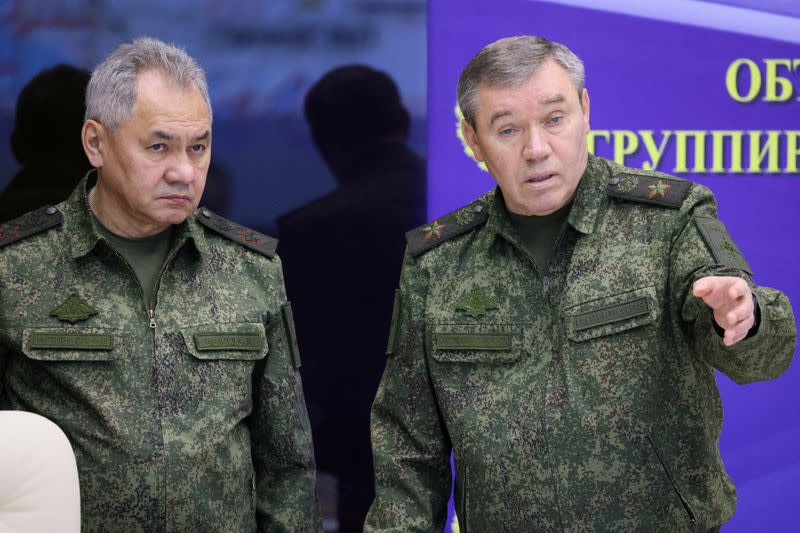General Gerasimov, Russia's top soldier, appears for first time since Wagner mutiny

(This July 10 story has been refiled to fix a typographical error in paragraph 1)
MOSCOW (Reuters) - Army General Valery Gerasimov, chief of the general staff of Russia's armed forces, was shown in public on Monday by the defence ministry for the first time since before the failed June 24 mutiny by the Wagner mercenary group, a sign that he had kept his job.
Here are some facts about Gerasimov:
AS CHIEF OF GENERAL STAFF
* Gerasimov, now 67, is the third most powerful man in the Russian military after President Vladimir Putin and Defence Minister Sergei Shoigu. Along with them, he is thought to hold one of the three nuclear briefcases that can transmit orders for a nuclear strike.
* The army general - second most senior rank in the armed forces - was appointed chief of the general staff and deputy defence minister by Putin on Nov. 9, 2012, three days after Putin's long-time ally Shoigu was made defence minister.
UKRAINE
* Gerasimov played key roles in Russia's seizure of Crimea from Ukraine in 2014 and in Russia's game-changing military support for President Bashar al-Assad in the Syrian civil war.
* The U.S. sanctioned him the day after the invasion of Ukraine, saying he was among those directly responsible.
* In January, Putin appointed Gerasimov to lead the Ukraine campaign, and made Army General Sergei Surovikin, appointed to the role three months earlier, one of his three deputies.
CRITICISM
* Many of the nationalist war bloggers who have licence to criticise the conduct of the war blamed Gerasimov for the fact that a superpower military - supposedly expensively modernised in the last 15 years - has failed so signally to subjugate its much smaller neighbour.
* Critics in the West and even inside Russia say the army has been naive, poorly equipped, slow to react and dogged by muddled command structures.
* After a mobilisation campaign last year failed to boost Russia's fortunes, rumours had swirled for months that Gerasimov, largely invisible to the public, would be sidelined.
* At war games in the Russian far east in September, the Zvezda military news service published video of Putin and Gerasimov sitting far apart in an observation booth in awkward silence while waiting for Shoigu to arrive.
* Yevgeny Prigozhin, head of the mercenary Wagner Group, fiercely criticised Gerasimov and Shoigu and staged a short-lived mutiny on June 23-24 to demand their dismissal.
* Gerasimov had not been seen in public since early June. He made no public appearance or statement during the mutiny, which Prigozhin called off after receiving a promise that he could go into exile and other mutineers would not face recriminations.
EARLIER LIFE
* Gerasimov was born on Sept. 8, 1955, in Kazan. He graduated from the Kazan Higher Tank Command in 1977, from the Malinovsky Military Armoured Forces Academy in 1987, and from the Military Academy of the General Staff another decade later.
* In 2007, he was appointed commander of the Leningrad Military District, and in 2009, commander of the Moscow Military District.
(Writing by Guy Faulconbridge and Gareth Jones; Editing by Kevin Liffey)

 Yahoo News
Yahoo News 
